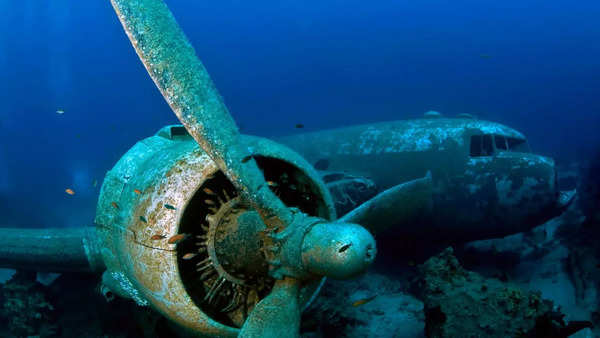Trending
"Perfect hiding place": Australian scientist claims to know the final resting spot of the missing MH370 flight
Australian scientist Vincent Lyne claims to have identified the final resting place of Malaysia Airlines Flight MH370, which vanished in 2014. Lyne argues the plane was deliberately flown into a 20,000-foot-deep “hole” in the Broken Ridge, a remote underwater plateau in the Indian Ocean, making it nearly impossible to find. He suggests a controlled ditching by the pilot, contradicting earlier crash theories, and calls for a renewed search in this specific area to solve the mystery.

An Australian scientist has claimed that he knows where the missing flight MH370's final resting place is. Source: AP
The mystery of Malaysia Airlines Flight MH370, which vanished on March 8, 2014, has puzzled experts and the public alike for over a decade. Recently, Australian scientist Vincent Lyne has reignited interest in this aviation enigma with a bold claim. Lyne, an adjunct researcher at the University of Tasmania’s Institute for Marine and Antarctic Studies, asserts that the plane’s disappearance was a deliberate act, orchestrated to ensure it would never be found.
Lyne’s theory centers on a specific location in the southern Indian Ocean known as the Broken Ridge, an underwater plateau characterized by steep ridges and deep ravines.

The scientist’s hypothesis challenges the widely accepted view that MH370’s disappearance was the result of a fuel-starved crash. Instead, Lyne suggests that the plane’s final moments were a controlled ditching, similar to the famous emergency landing of US Airways Flight 1549 in the Hudson River by Captain Chesley “Sully” Sullenberger in 2009. Lyne argues that the damage to the plane’s wings, flaps, and flaperon supports this theory, indicating a deliberate and skillful maneuver rather than an uncontrolled descent.
The Broken Ridge, located in the southeastern Indian Ocean, is a challenging environment for underwater searches. Its steep ridges and deep ravines create a complex landscape that can easily conceal large objects. Lyne emphasizes that previous search efforts failed to consider this specific area, which he believes is why the plane has not been found. He argues that science unmistakably points to this location as the final resting place of MH370.
Lyne’s findings have sparked renewed interest and debate within the scientific community and among those who have followed the MH370 mystery. His research paper, accepted by the Journal of Navigation, outlines his theory in detail and calls for a new search effort focused on the Broken Ridge. Whether this new approach will finally solve the mystery of MH370 remains to be seen, but Lyne is confident that his work provides a compelling case for where the plane lies.
The disappearance of MH370 has been one of the most enduring aviation mysteries of the 21st century. With 239 people on board, the flight’s sudden vanishing left families and investigators searching for answers with no relief in sight. Lyne’s theory offers a new perspective on the events of that fateful night, suggesting that the plane’s disappearance was not a tragic accident but a calculated act designed to ensure it would never be found. As the search for MH370 continues, Lyne’s work may provide the key to unlocking this decade-old mystery.
Did you like this article? Please let us know in the comments below!
Lyne’s theory centers on a specific location in the southern Indian Ocean known as the Broken Ridge, an underwater plateau characterized by steep ridges and deep ravines.
He believes that the aircraft was intentionally flown into a 20,000-foot-deep “hole” in this remote and rugged underwater terrain. According to Lyne, this site provided the perfect hiding place for the aircraft, making it nearly impossible to locate with conventional search methods.

Representative image
The scientist’s hypothesis challenges the widely accepted view that MH370’s disappearance was the result of a fuel-starved crash. Instead, Lyne suggests that the plane’s final moments were a controlled ditching, similar to the famous emergency landing of US Airways Flight 1549 in the Hudson River by Captain Chesley “Sully” Sullenberger in 2009. Lyne argues that the damage to the plane’s wings, flaps, and flaperon supports this theory, indicating a deliberate and skillful maneuver rather than an uncontrolled descent.
Lyne’s research draws on data from the pilot’s home flight simulator, which he claims shows a flight path intersecting with the longitude of Penang Airport. This route, previously dismissed by the FBI and other investigators as irrelevant, is now seen by Lyne as a critical clue. He believes that the pilot, Zaharie Ahmad Shah, meticulously planned the flight to end in this specific location, ensuring the aircraft would remain hidden from search efforts.
The Broken Ridge, located in the southeastern Indian Ocean, is a challenging environment for underwater searches. Its steep ridges and deep ravines create a complex landscape that can easily conceal large objects. Lyne emphasizes that previous search efforts failed to consider this specific area, which he believes is why the plane has not been found. He argues that science unmistakably points to this location as the final resting place of MH370.
Lyne’s findings have sparked renewed interest and debate within the scientific community and among those who have followed the MH370 mystery. His research paper, accepted by the Journal of Navigation, outlines his theory in detail and calls for a new search effort focused on the Broken Ridge. Whether this new approach will finally solve the mystery of MH370 remains to be seen, but Lyne is confident that his work provides a compelling case for where the plane lies.
The disappearance of MH370 has been one of the most enduring aviation mysteries of the 21st century. With 239 people on board, the flight’s sudden vanishing left families and investigators searching for answers with no relief in sight. Lyne’s theory offers a new perspective on the events of that fateful night, suggesting that the plane’s disappearance was not a tragic accident but a calculated act designed to ensure it would never be found. As the search for MH370 continues, Lyne’s work may provide the key to unlocking this decade-old mystery.
Did you like this article? Please let us know in the comments below!
Iran-backed Houthis Locate Israeli 'Weakness', Threaten 'Painful Strikes Deep Inside' Tel Aviv
End of Article
FOLLOW US ON SOCIAL MEDIA









